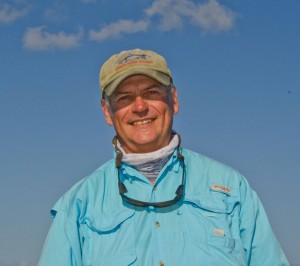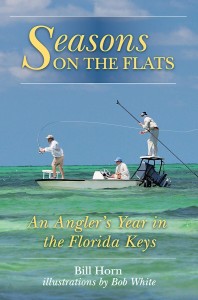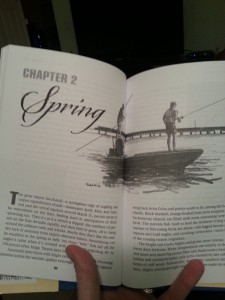I first learned about Seasons on the Flats by seeing some of the art work for the book done by Bob White. That got me interested and so I tracked down Bill Horn and asked him to do an interview. That we did. It took me a while (like, 3 months) to sit down to transcribe it and it was at that point I realized the recording must not have started on the phone call… “0 Seconds” is all it said.
Crap.
So, Bill finally sent me an email on something else and I had to confess that I had failed to record the initial interview and he quickly, and graciously, offered to do it a second time. So, I’m glad to have this interview with Bill Horn, author of the upcoming Seasons on the Flats (out this month), to share with all of you.

The Author, Bill Horn
Your book is called “Seasons on the Flats,” what was it that drove you to write this book?
I did a few magazine articles (my first ventures into outdoor writing) and submitted one titled “Tarpon Camp” that got rejected. Started to rework it and got the idea of taking a Keys’ visitors through an angler’s season. That idea, and the fun of telling tales about these wonderful little islands, got me going and the “book” just poured out in the next few weeks. “Seasons” is my love letter to the Keys.
Given the book chronicles the seasons, which is your favorite to be there?
Ouch – that’s a tough question as each season has its distinct pleasures. Summer is probably my favorite with good bonefishing, permit, junior tarpon in the backcountry, enough big poons to make it interesting, lobster season, night reef fishing, and hanging out on sandbars in warm clear waters with a cold one in hand. Of course, this gets interrupted periodically by hurricanes and tropical storms but it’s the price you pay for being in subtropical latitudes.
The Keys have a reputation as being a bit rough… the fishing is difficult, the guides prone to yelling and the number of people to contend with are growing… how do you feel the stereotypes match the reality?
The Keys’ flats demand your “A” game but that’s what makes it great — it is never boring. These are the major leagues for flats anglers. The tarpon and permit fishing remain excellent and bonefish are still there (just not in the numbers in places like the Bahamas or Mexico). And newcomers shouldn’t shy away. The guides might be intense (the days of yelling are years past) but damn they’re good and a few days with a veteran Keys’ guide is a great learning experience. Crowding and conflicts with others do occur, especially during spring tarpon and in the Upper Keys, but that’s why there’s summer and fall and the Middle Keys.

This is my kind of thing.
When you look at the future of fishing in the Keys, what are the biggest threats?
Water quality is the big threat but the outlook is good. The Keys are systematically retiring their septic systems and that should improve inshore waters. Plus the Everglades restoration projects are finally getting into gear and in a few years water flowing into Florida Bay (quantity and quality) should also get better. Although not a threat per se, the years of not knowing much about bonefish, permit and tarpon are ending. Research by BTT and the Florida Wildlife Commission are shedding new light on fish migrations, spawning behavior, rearing habitats, etc. With this kind of information finally available, there will be new opportunities to make good fishery management decisions to bring back the bonefish to historical levels and hold onto the great tarpon and permit fisheries we presently enjoy.
When looking for bonefish, what is your go-to rig (rod/reel)?
I’m pretty old school – been using the same 8 weight Scott STS and Abel 3N for years. I like to upline my rods and have grown partial to the Wulff Bermdua lines. Use as long as leader as you can and my favorite Keys bonefish fly may be a surprise – a big old #2 Red Headed Gotcha.
The Keys are also knows for their characters. You have a story about one of those?
Being the end of the road, an eclectic entertaining bunch of souls do collect in the Keys. For regular chuckles, check out the “crime reports” in the Key West newspaper. Last year’s favorite was a minor car wreck caused by a woman shaving her nether regions while driving to her boyfriend’s house with her ex-husband in the car.
I have seen some of the illustrations in the book done by Bob White. How did you come to work with him?
Met Bob about 20 years ago when he was head guide for Tikchik Narrows Lodge in Alaska. We fished together and I was an instant admirer of his art. When the book was almost done, I wanted it to look classy and that meant one thing – get Bob to do the illustrations. It took one phone call to make it happen. His 15 pencil sketches in “Seasons” are wonderful; the three maps and the hammerhead shark are my favorites and you can purchase originals or prints from him.

Work by Bob White
In our fishing lives we run into people who, for one reason or another, give of their knowledge to help us out. Is there someone who has been instrumental to your growth as a flats fisherman down in the Keys?
Getting introduced to Albert Ponzoa, Bus Bergmann, and Rich Keating – three outstanding Marathon guides – really opened the door to the Keys’ flats. I had fished the Keys as a kid in the 50’s, and caught my first bonefish in 1974, but these guys took me to a whole new level. They taught me a lot, prodded me to improve my skills, laughed and cheered when we enjoyed success, and cried with me when the fish kicked my ass. An angler, and friend, can’t ask for more.
Thanks for doing this twice Bill and I look forward to reading that book!








